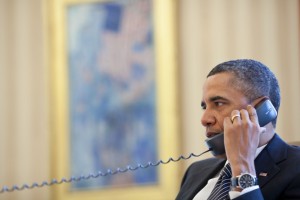
The CIA has been emptying the shelves of its secret warehouses where it stores light weapons whose origins can't be easily traced back to Washington, sending the materiel to the supposedly "moderate" Syrian rebels. But that "covert operation" is now at a crossroads after Islamists seized a rebel supply depot in northern Syria.
One of President Barack Obama's longtime fears about providing lethal assistance to the Syrian rebels was just that possibility, that U.S.-supplied weapons would fall into the hands of Islamists, even some tied to al-Qaeda, and thus help to make Syria a new base for terrorism aimed at the West.
That nightmare appears to be fast becoming a reality as jihadists swarm into Syria from around the Muslim world, drawing financial and military support from Saudi Arabia and other right-wing Persian Gulf states, and pushing aside the more secular rebels opposing President Bashar al-Assad's government in Damascus.
The latest example of this jihadist trend was the Islamic Front's seizure of the U.S.-backed Supreme Military Council's headquarters and its supply depot -- containing food, trucks and ammunition -- near the Turkish border last Friday. The State Department announced on Wednesday that non-lethal supplies to the Syrian rebels would be suspended.
Though the Obama administration presented the suspension as temporary -- and it does not apparently affect the CIA's lethal supply routes to rebels mostly in the south -- I'm told that U.S. policy is poised to take what could be a dramatic turn, possibly bringing together an anti-al-Qaeda alliance involving Assad's army, non-Islamist rebels and even Hezbollah forces.
Obama's shift in thinking may become more apparent during upcoming peace talks in Switzerland as U.S. and Russian diplomats look for ways to achieve a power-sharing agreement between Assad's Alawite-dominated regime and the more moderate opposition, which is mostly Sunni. Syria's Alawite minority is an offshoot of Shiite Islam. Many of Syria's Christians also continue to back the secular Assad.
However, if Obama moves toward a political agreement that gives the Sunni majority more power without dismantling Assad's government, the President is sure to be confronted with fierce opposition from the new Saudi-Israeli alliance which has formed around a joint determination to shatter the so-called Shiite Crescent, which now reaches from Iran through Iraq and Syria to Lebanon.
Both Saudi Arabia and Israel see Iran as their principal adversary in the region and view the Assad regime as the keystone of Iran's influence. Though Saudi Arabia and Israel might have preferred less extremist Sunni jihadists to win Syria's civil war, both countries have indicated a preference for radical Sunnis ruling Syria over Assad, the Iranian ally.
In mid-September, Israel's Ambassador to the United States Michael Oren announced that Israel wanted Saudi-backed extremists to win if the other possible outcome was continuation of the Iran-backed Assad.
"The greatest danger to Israel is by the strategic arc that extends from Tehran, to Damascus to Beirut. And we saw the Assad regime as the keystone in that arc," Oren told the Jerusalem Post in an interview. "We always wanted Bashar Assad to go, we always preferred the bad guys who weren't backed by Iran to the bad guys who were backed by Iran." He said this was the case even if the other "bad guys" were affiliated with al-Qaeda.
Obama's Reluctance
But President Obama has grown increasingly leery of the Saudi-Israeli alliance and its obsession with Iran. Over the past several months, he has tilted more toward the Russian position favoring power-sharing concessions from the Assad regime, perhaps even Assad's eventual departure, but to hold the line against a jihadist victory.
That recognition was a factor in Obama's decision last summer not to launch military strikes in response to a chemical weapons incident on Aug. 21. The President came to realize that even a limited series of missile attacks to "degrade" Assad's military might have played into the hands of the jihadists who were being encouraged by the Saudis to seize that moment for a major, possibly decisive offensive.
Obama also feared that U.S. military intervention in Syria might have led to a regional conflagration fought along sectarians lines, pitting the Sunnis against the Shiites, with the Israelis siding with the Sunnis under the old theory that "my enemy's enemy is my friend." Instead of a possible rapprochement with Shiite-ruled Iran, the United States might have found itself joining Israel in aerial bombardments of Iran's nuclear facilities.
Peering down that dark alleyway, Obama recoiled. He began searching for a different route, one that would use diplomacy to rid the Syrian government of its chemical weapons and get Iran to accept more restrictions on its nuclear program to ensure that a nuclear bomb would not be built.
Now, I'm told, Obama's thinking has evolved into a vision of a new strategic order in the Middle East, with Iran and Russia joining with the United States to tamp down the violence across the region and forcing the Israelis to choose between Saudi Arabia (and its jihadist clients) or Obama's diplomatic initiative to address longstanding problems, including the Palestinian issue.
One source familiar with the Obama administration's approach said the recent shifts put Israeli Prime Minister Benjamin Netanyahu in a tough -- and possibly untenable -- spot, either abandoning his hard-line attitudes or facing a political challenge from more moderate Israelis.
(Note: You can view every article as one long page if you sign up as an Advocate Member, or higher).





